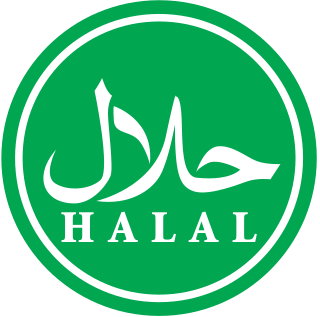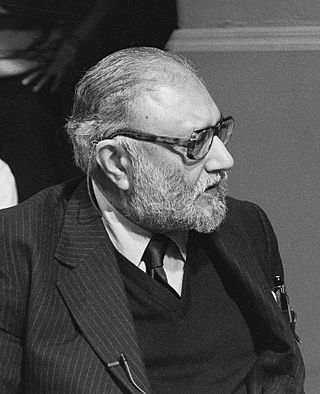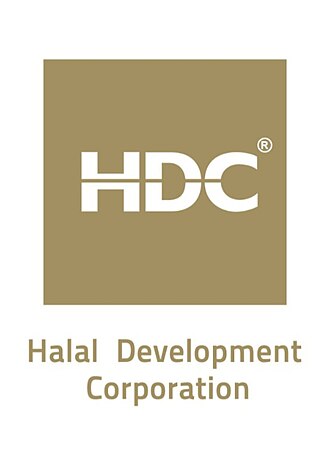
Halal is an Arabic word that translates to 'permissible' in English. In the Quran, the term halal is contrasted with the term haram. This binary opposition was elaborated into a more complex classification known as "the five decisions": mandatory, recommended, neutral, reprehensible and forbidden. Islamic jurists disagree on whether the term halal covers the first two or the first four of these categories. In recent times, Islamic movements seeking to mobilize the masses and authors writing for a popular audience have emphasized the simpler distinction of halal and haram.

The Asian Institute of Technology (AIT), founded in 1959, is an international organization for higher education situated 40km north of Bangkok, Thailand. It specializes in engineering, advanced technologies, sustainable development, and management and planning. It aims to promote technological change and sustainable development in the Asia-Pacific region, through higher education, research, and outreach.

King Mongkut's Institute of Technology Ladkrabang is a research and educational institution in Thailand. It is situated in Lat Krabang District, Bangkok approximately 30 km east of the city center. The university consists of nine faculties: engineering, architecture, science, industrial education and technology, agricultural technology, information technology, food industry, liberal arts, and medicine.

Mahidol University is an autonomous public research university in Thailand. The university was founded as part of Siriraj Hospital in 1888. It was first called the University of Medical Science in 1943, and has been recognized as Thailand's fourth public university. The university was renamed in 1969 by King Bhumibol Adulyadej for his father, Prince Mahidol of Songkhla, known as the "Father of Modern Medicine and Public Health in Thailand".

The University of Karachi is a public research university located in Karachi, Sindh, Pakistan. Established in June 1951 by an act of Parliament and as a successor to the University of Sindh, the university is a "Sindh Government University" and designed by Mohsin Baig as its chief architect.

The University of Khartoum is a public university located in Khartoum, Sudan. It is the largest and oldest university in Sudan. UofK was founded as Gordon Memorial College in 1902 and established in 1956 when Sudan gained independence. Since that date, the University of Khartoum has been recognized as a top university and a high-ranked academic institution in Sudan and Africa.

The Scientific and Technological Research Institution of Turkey is a national agency of Turkey whose stated goal is to develop "science, technology and innovation" (STI) policies, support and conduct research and development, and to "play a leading role in the creation of a science and technology culture" in the country.
Çanakkale Onsekiz Mart University is a Turkish public research university located in Çanakkale (Dardannelles) province and its surrounding towns. It is a member of the Balkan Universities Network, the European University Association (EUA), International Association of Universities (IAU), and the Thrace Universities Union. It hosted the World Universities Congress in 2010.

Mykolas Romeris University is an international university located with campuses in Vilnius and Kaunas, Lithuania.

Atta-ur-Rahman, h-index 75, with 36,000 citations is a Pakistani organic chemist and is currently serving as Professor Emeritus at the International Center for Chemical and Biological Sciences at the University of Karachi and as Chairman of PM Task Force on Science and Technology. He has twice served as the President of Pakistan Academy of Sciences. He was the Federal Minister of Science and Technology (2000-2002), Federal Minister of Education (2002) and Chairman Higher Education Commission with status of Federal Minister (2002-2008) He is also the President of the Network of Academies of Sciences in Countries of the Organisation of Islamic Countries (NASIC). After returning to Pakistan from Cambridge after completing his tenure as Fellow of Kings College, Cambridge University, he contributed to the development of the International Center for Chemical and Biological Sciences at the University of Karachi, and transforming the landscape of higher education, science and technology of Pakistan. He is Fellow of Royal Society (London), Life Fellow of Kings College, Cambridge University, UK.,, Academician Chinese Academy of Sciences and Professor Emeritus at University of Karachi

A food contaminant is a harmful chemical or microorganism present in food, which can cause illness to the consumer.

The National Ilan University is a public university in Yilan City, Yilan County, Taiwan.

Nanchang University is a provincial public university in Nanchang, Jiangxi, China. It is affiliated with the Province of Jiangxi, and co-sponsored by the Jiangxi Provincial People's Government and the Ministry of Education of China. The university is part of Project 211 and the Double First-Class Construction.

Science and technology is a growing field in Pakistan and has played an important role in the country's development since its founding. Pakistan has a large pool of scientists, engineers, doctors, and technicians assuming an active role in science and technology. The real growth in science in Pakistan occurred after the establishment of the Higher education Commission in 2002 which supported science in a big way and also became the major sponsor of the Pakistan Academy of Sciences under the leadership of Prof. Atta-ur-Rahman. The emphasis was placed on quality rather than numbers during this period. The quality measures introduced by Prof. Atta-ur-Rahman as Founding Chairman HEC included:1) All Ph.D. thesis were evaluated by eminent foreign scientists,2) All PhD theses and research papers were checked for plagiarism 3) Some 11,000 students were sent abroad to leading universities for PhD level training and absorbed on their return, 4) Appointments at faculty positions were linked to international stature of the applicants as judged from their international publications, patents and citations, and (5) Quality Enhancement Cells were established in all universities for the first time in the history of the country. (6) The minimum criteria for establishment of a new university were approved by the Cabinet and universities that did not meet these criteria were closed down. (7) The Model University Ordinance was approved setting the governance parameters for new universities. (8) A list of fake higher education institutions was prepared and made public. (9) Quality Assurance Agency (QAA) was set up within the Higher Education Commission that established Quality Enhancement Cells (QECs) as its operational units in public and private-sector universities across the country. (10) The funding of universities was linked to excellence in teaching and research under a formula based funding mechanism that considered enrolment, subjects and quality of teaching and research. The first IT policy and implementation strategy was approved under the leadership of Prof. Atta-ur-Rahman, then Federal Minister of Science & technology, in August 2000 which laid the foundations of the development of this sector On the request of Prof. Atta-ur-Rahman, Intel initiated a nationwide programme to train school teachers in Information and Communication technologies in March 2002 which has led to the training of 220,000 school teachers in 70 districts and cities across Pakistan. A 15-year tax holiday was approved on the recommendation of Prof. Atta-ur-Rahman which has resulted in growth of IT business from $30 million in 2001 to over $3 billion. The Pakistan Austria University of Applied Engineering (Fachhochschule) has been established in Haripur Hazara under a Steering Committee Chaired by Prof. Atta-ur-Rahman in which students will get degrees from several Austrian universities. Pakistan's growth in scientific output can be seen from the fact that in 1990 Pakistan published 926 scholarly documents while in 2018 the number rose to 20548, a twenty times increase.In contrast India published 21443 scholarly documents in 1990 and the number rose to 171356 in 2018, an eight times increase. In 2018, 336 people per million were researchers in the R&D in Pakistan compared to 256 people per million being researchers in India. The reforms begun by Prof. Atta-ur-Rahman FRS in 2003-2008 have continued over the subsequent decade and according to the Web of Science report, there was a 300% growth in research publications in 2019 over the decade, with 2019 marking the first year in which Pakistan was ranked above the world average in research. In 2019, Pakistan produced 300% more publications indexed in the Web of Science Core Collection than in 2010. In the decade of 2010-2019, more than half of Pakistan’s research was published in journals with Impact Factor. The global influence of Pakistan’s research is increasing as scientists in the country are publishing more in top quartile journals. The Category Normalized Citation Impact of Pakistan’s publications has risen from 0.67 to 1.03. output. As of 2020, Pakistan has 85% teledensity with 183 million cellular, 98 million 3G/4G and 101 million broadband subscribers, due to the foundations laid by Prof. Atta-ur-Rahman of the IT and telecom industry during 2000-2008. In an analysis of scientific research productivity of Pakistan, in comparison to Brazil, Russia, India and China, Thomson Reuters has applauded the developments that have taken place as a result of the reforms introduced by Prof. Atta-ur-Rahman FRS, since Pakistan has emerged as the country with the highest increase in the percentage of highly cited papers in comparison to the "BRIC" countries

Hani Mansour M. Al-Mazeedi is a Kuwaiti scientist who specializes in halal requirements, quality and safety systems for food and halal services for the halal Industry.

Jiangnan University (江南大学) is a public university located in Wuxi, Jiangsu, China. It is affiliated with the Ministry of Education, and co-sponsored with the Jiangsu Provincial Government. The university is part of Project 211 and the Double First-Class Construction.

National Economics University is a public research university in Hanoi, Vietnam. Founded in 1956, its history and influence have made it one of the leading universities in Economics, Public Administration and Business Administration in Vietnam.NEU is now chairing a network of more than 40 universities in Vietnam in economics and business administration. It is also a prestigious research and consultation center with its publications and consulting works to the government of Vietnam on policy making and to the business community on business development.Since its establishment, NEU has paid special attention to developing international academic cooperation. It has formed partnership relationship with over 100 institutions and organizations from 30 countries, including Australia, Belgium, Cambodia, Canada, China, France, Germany, Japan, Laos, Netherlands, South Korea, Taiwan, United Kingdom, Italy and United States. The university has been involved in research projects in cooperation with large governmental organizations and international financial institutions such as the Japanese International Cooperation Agency (JICA), the Foundation of Vietnam Development Forum (VDF), the National Graduate Institute for Policy Studies (GRIPS), the World Bank (WB), the Asian Development Bank (ADB), the Department for International Development, and Ausaid (Australia).Many of the university's alumni have a strong track record of success and hold important positions in public and private sectors. History

Winai Dahlan is the Founder Director of the Halal Science Center Chulalongkorn University. He is also the Head of The Lipid and Fat Science Research as well as International Graduate Program Chair in Food and Nutrition, Faculty of Allied Health Sciences, Chulalongkorn University.

Culinary diplomacy, gastrodiplomacy or food diplomacy is a type of cultural diplomacy, which itself is a subset of public diplomacy. Its basic premise is that "the easiest way to win hearts and minds is through the stomach". Official government-sponsored culinary diplomacy programs have been established in Taiwan, South Korea, Singapore, Thailand, Malaysia, Indonesia, Lebanon, Peru, Israel, the United States, Cambodia, Japan, and Nordic countries.

Halal Development Corporation Berhad, or HDC, is a Malaysian federal government agency mandated as the custodian of Malaysia's Halal economy, and featured as a trusted partner in the Halal business. Its mission is to generate opportunities for the community of stakeholders within Malaysia's Halal ecosystem.



















